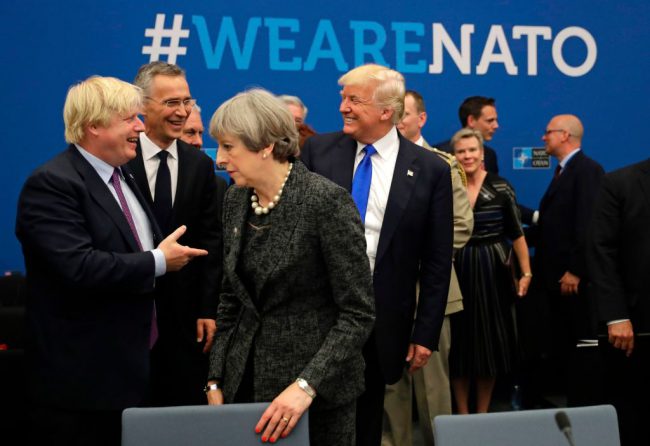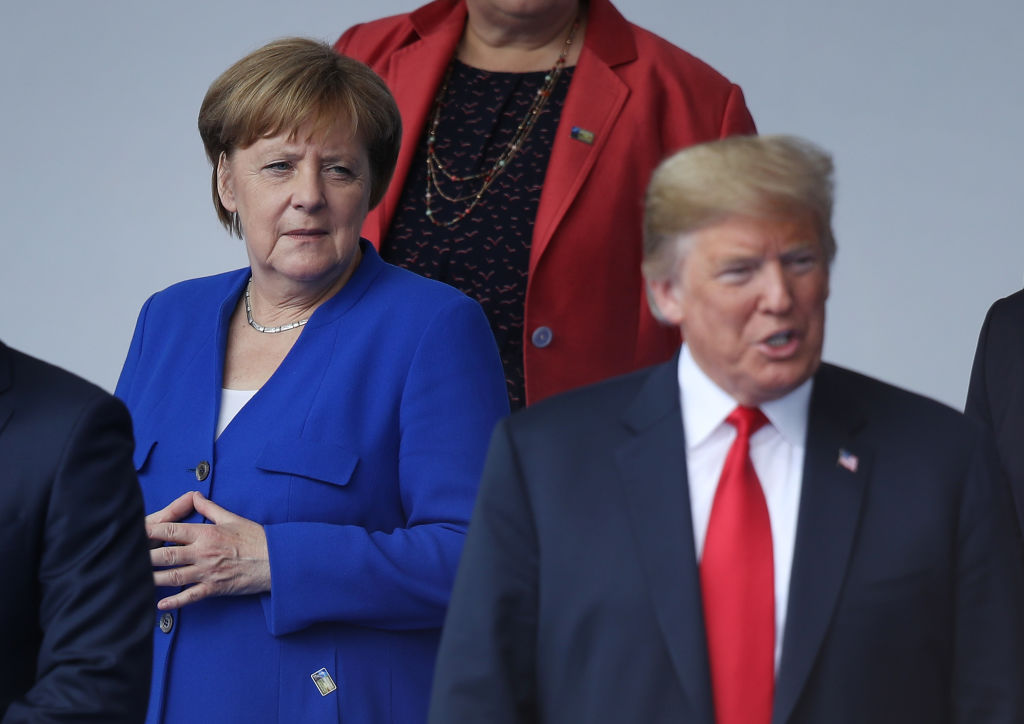Unleashing in-your-face rhetoric at the NATO summit, U.S. President Donald Trump pressed the falsehood Wednesday that members of the alliance owe money to the U.S. and took sole credit for higher military spending by NATO partners — a decision that preceded his presidency.

Trump also misrepresented Germany’s energy picture, asserting coal and nuclear power are gone from the mix. Coal remains a bedrock energy source for Germany despite its hope to wean itself from that mineral and nuclear plants have several years of life before they are to be phased out.
Here’s a look at some statements from the summit in Brussels:
TRUMP: “Frankly, many countries owe us a tremendous amount of money for many years back, where they’re delinquent, as far as I’m concerned, because the United States has had to pay for them. So if you go back 10 or 20 years, you’ll just add it all up. It’s massive amounts of money is owed.” — comments at meeting with NATO Secretary-General Jens Stoltenberg. In a tweet Tuesday, he said: “Will they reimburse the U.S.?”
THE FACTS: There is no such debt to the U.S. or to NATO. Therefore, no delinquency or question of reimbursement.
He is referring to how much each NATO country spends on its own defense and pressing them to spend more. Doing so would relieve some pressure on U.S. military spending. But there are no IOUs to collect from past years.
___
TRUMP: “Because of me, they’ve raised about $40 billion over the last year.” — remarks about NATO member spending on defense at breakfast with Stoltenberg.
STOLTENBERG: “Last year was the biggest increase in defense spending across Europe and Canada in that generation.”
TRUMP: “Why was that last year?”
STOLTENBERG: “It’s also because of your leadership, because of your carried message.”
THE FACTS: Trump prodded Stoltenberg to give him credit for rising military spending by NATO members, the NATO chief obliged and various officials in the alliance think Trump’s tough talk has had an effect. But the overarching move to increase defense spending by NATO countries began under President Barack Obama.
In 2014, NATO members agreed to stop cutting their military budgets and set a goal of moving “toward” spending 2 percent of their gross domestic product on their own defense by 2024. Most NATO members are spending less than 2 percent, though more are moving in that direction.
But on Wednesday, Trump roiled the summit by calling on NATO members to more than double their military budgets, saying they should be devoting 4 percent of their economy to defense. That would be up from a collective 1.47 percent this year for non-U.S. NATO allies, according to NATO estimates. Not even the U.S. spends 4 percent of its GDP on defense, according to NATO statistics.

Get breaking National news
The alliance lists the U.S. as spending an estimated 3.5 percent of its GDP on its military budget this year. Trump said “actual” U.S. military spending is 4.2 percent of GDP, without explaining the big discrepancy.
WATCH: NATO leaders pose for traditional group photo as summit begins

Stoltenberg estimated European allies and Canada will add $266 billion to their military spending by 2024 and said “this is really adding some extra momentum,” apparently meaning Trump’s pressure.
Trump has assailed NATO members such as Germany for lagging on their military budgets while he has simultaneously taken credit for progress on that front. He has repeatedly claimed that because of his pressure “billions and billions of dollars are pouring in,” which is not true, because there is no such fund for money to pour into.
WATCH: Democrats, Republicans split on Trump’s talk at NATO summit

German Defense Minister Ursula von der Leyen told NPR on Wednesday that Trump makes a fair point that Germany should spend more but is not the first U.S. president to urge that. She said she and Obama discussed the topic.
WATCH: NATO leaders including Trudeau and Trump attend party, working dinner

___
TRUMP: “Germany is a captive of Russia because they supply (energy). They got rid of their coal plants. They got rid of their nuclear. They’re getting so much of the oil and gas from Russia. I think it’s something that NATO has to look at.”
THE FACTS: He’s wrong about coal-fired and nuclear energy and overstated Germany’s reliance on Russian natural gas. In 2017, Germany got more than one-third of its energy for electricity from coal and nearly 12 percent from nuclear plants. One-third came from renewable energy. Only 13 percent came from natural gas, with Russia as the major supplier.
Trump was objecting to Germany’s acceptance of a new pipeline project that will bring more natural gas from Russia.
Germany plans to retire nuclear plants by 2022 and intends to reduce its reliance on coal. But Germany has not “got rid” of either.
___
TRUMP: “You know, we’re protecting Germany, we’re protecting France. We’re protecting everybody. And yet we’re paying a lot of money to protect.”
THE FACTS: There’s no question U.S. military spending constitutes well over a majority of the alliance’s overall spending on defense. NATO acknowledges an “over-reliance” on the U.S.
What NATO partners dispute is Trump’s repeated suggestion that the U.S. gets little in return for its commitment to defend member countries if threatened. Trump does not acknowledge that NATO partners are expected to defend the U.S. if threatened. Article 5, the collective defense portion of the North Atlantic Treaty has been invoked just once — following the attacks of Sept. 11, 2001.
WATCH: NATO Secretary General pressures allies on spending after Trump meeting

Moreover, Stoltenberg argued Wednesday that the U.S. military presence in Europe, through the 29-country alliance, gives it an advantage in dealing with Russia and projecting power in the Middle East and Africa.
___
Associated Press writers David Rising in Berlin and Robert Burns and Zeke Miller in Washington contributed to this report.











Comments
Want to discuss? Please read our Commenting Policy first.